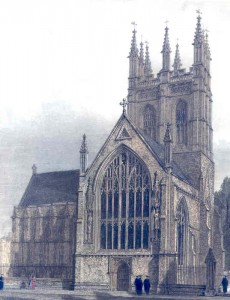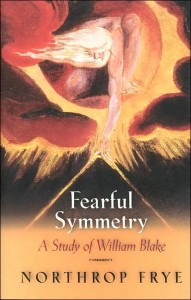
Merton College Chapel
Rodney Baine, mentioned in the 1950 diary entry for 23 August, was a U.S. Rhodes Scholar studying at Oxford, whom Frye met during his early days at Merton College in 1936 –– one of several fellow students he chummed around with. Other friends were Joseph Reid from Manitoba, Alba Warren from Texas, Charles Bell from Mississippi (all Rhodes Scholars) and a hard‑drinking New Zealander, Mike Joseph. In 1937 Frye spent time between terms touring Italy with Baine and Joseph and once back in Oxford he took up residence in a boarding house some distance from Merton College, sharing a suite with Baine and Joseph. Frye apparently had not seen Baine between their Oxford days and the 1950 chance encounter on Massachusetts Avenue in Cambridge, where Frye was studying during his Guggenheim year. After stints at MIT, the University of Richmond, and Delta State University of Alabama at Montevallo, Baine landed a teaching position in 1962 at the University of Georgia, where he became a distinguished eighteenth‑century scholar. Among his publications were books on on William Blake, Daniel Defoe, Robert Munford, and James Oglethorpe. In 1981 Baine’s son James established the Rodney M. Baine Lecture Fund to commemorate his father, and in April 1982 Frye presented the Rodney Baine Lecture, “An Illustrated Lecture of Blake’s Jerusalem” at the University of Georgia. Baine died in 2000.
In the full diary entry for 23 August 1950 Frye wrote, “Evidently he [Baine] was closely involved in the Charlie-Mildred bust up: in fact he had a hand in drawing up the articles of separation, & is still friendly & still corresponds with both. He says that when we saw them they probably weren’t even living together, as Mildred had kicked him out of the house soon after he got back from Italy.” The reference is to the divorce of Charlie Bell and Mildred Winfree, with whom he had lived during his year at Oxford. Frye adds: “Charlie’s present wife [Diana (Danny) Mason] is a Quaker, & he reports that he has had the happiest year of his life. Bell later taught at Princeton, the University of Chicago, and St. John’s College in both Annapolis and Santa Fe. Several years back Charlie Bell sent me his reminiscences about Frye from the time of their Oxford years. I reproduce it here, with editorial insertions in square brackets:

